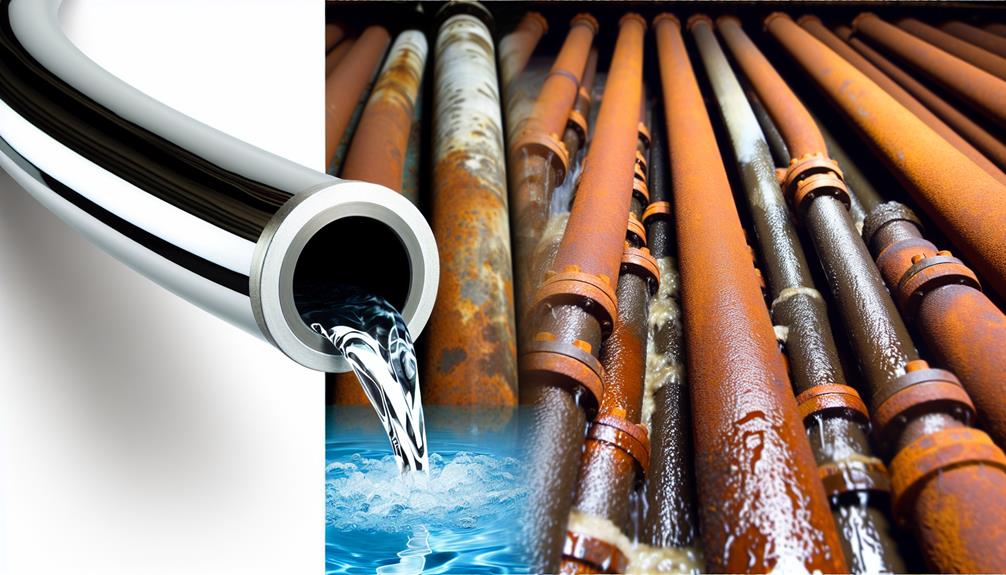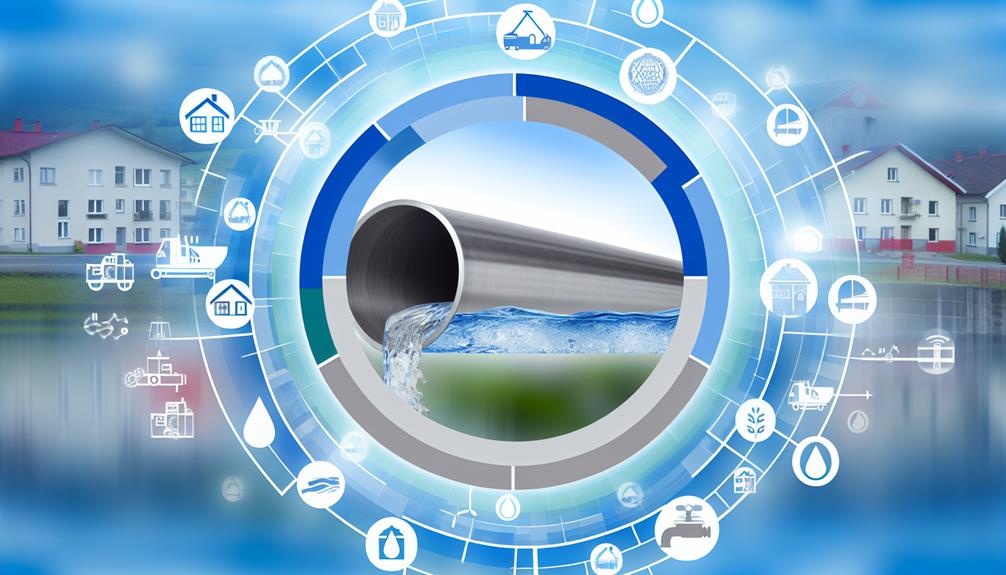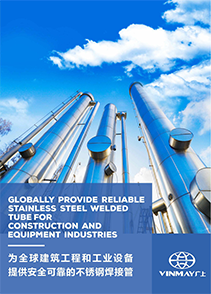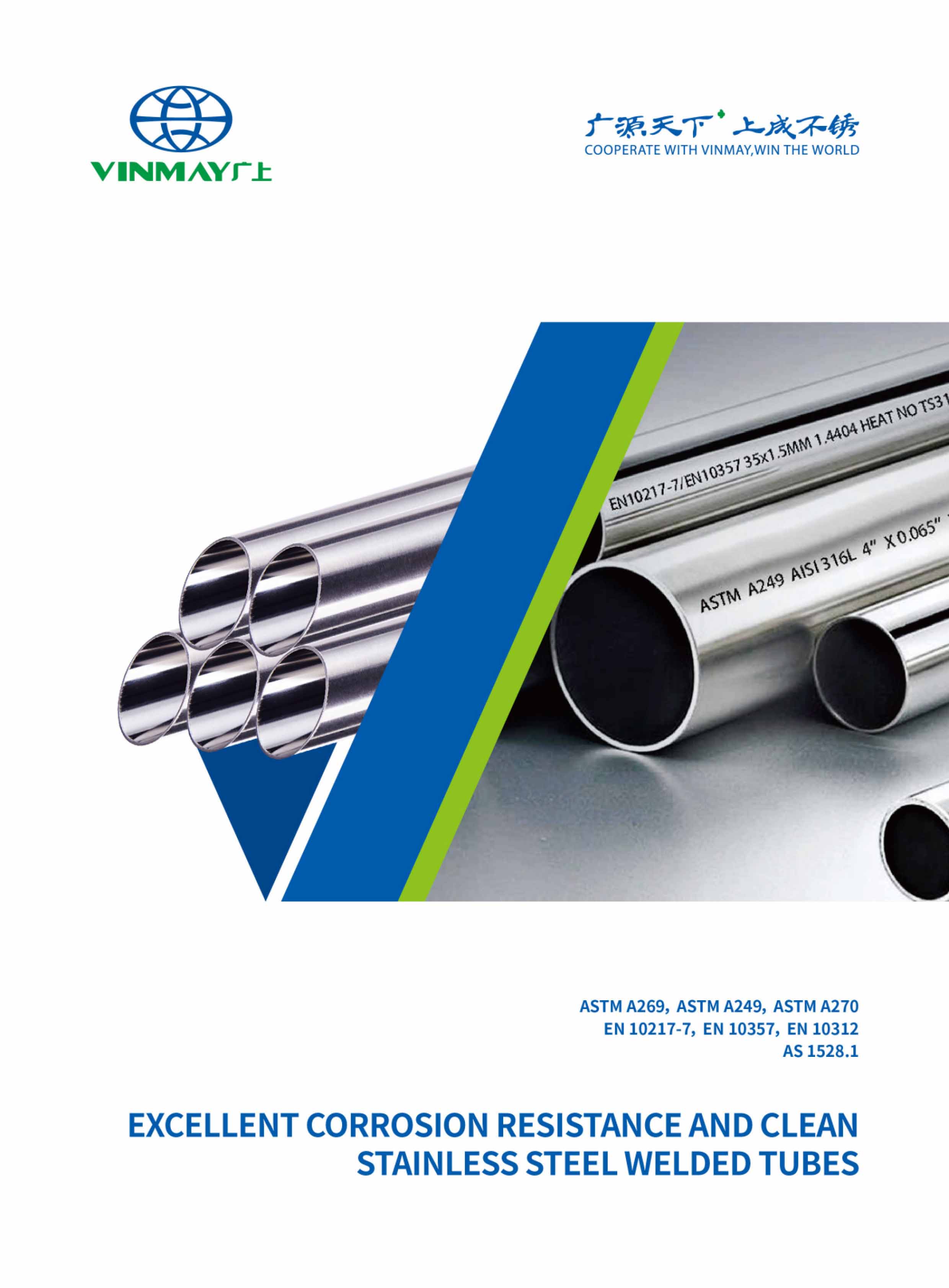Stainless steel pipes are highly recommended for water systems due to their exceptional durability and corrosion resistance. These pipes maintain water quality and system reliability even under high-pressure conditions and in aggressive water environments. Their intrinsic strength supports their use in both high and low-pressure settings, suitable for municipal water supply and industrial wastewater systems. Critical factors such as material grade play an essential role in optimizing corrosion resistance and overall pipe longevity. Stainless steel's hygienic properties also prevent bacterial growth, ensuring the safety of potable water. Exploring further could reveal additional insights into maximizing the effectiveness of stainless steel pipes in water systems.

Selecting stainless steel pipes for water systems offers unmatched durability and corrosion resistance, essential for maintaining long-term water quality and system reliability. The inherent strength and ductility of stainless steel ensure that these pipes can withstand high-pressure environments and aggressive water conditions without succumbing to wear and tear. This durability greatly reduces the likelihood of system failures and costly downtime.
Stainless steel's excellent corrosion resistance is largely due to its chromium-rich oxide layer that spontaneously forms and regenerates, effectively shielding the metal from corrosive agents. This property eliminates the need for additional protective coatings, which can degrade over time and compromise water purity. As a result, stainless steel pipes offer a more hygienic solution by minimizing the risk of contamination and ensuring the delivery of safe drinking water.
From a cost-efficiency perspective, the long service life and low maintenance requirements of stainless steel pipes make them a financially sound choice. Although the initial investment may be higher compared to other materials, the extended lifespan and minimal upkeep translate to substantial cost savings over time.
Additionally, stainless steel is 100% recyclable, supporting environmental sustainability. Its production and disposal exert minimal environmental impact, aligning with eco-friendly building practices.
Stainless steel pipes are extensively utilized in a variety of water-related applications due to their superior corrosion resistance and mechanical properties. These pipes, being highly durable and robust, are ideal for both high and low-pressure environments, making them suitable for everything from municipal water transport to industrial wastewater systems. The corrosion resistance of stainless steel guarantees that the pipes do not degrade or contaminate the water they carry, which is essential for maintaining the hygienic properties of potable water systems.
The strength and ductility of stainless steel pipes allow them to withstand the physical stresses of underground installations and variable water pressures, which contributes significantly to their longevity and reduces the likelihood of leakage. This durability directly supports cost efficiency by minimizing maintenance needs and prolonging the service life of the infrastructure.
From an environmental perspective, the sustainability of stainless steel pipes is enhanced by their recyclability. At the end of their long functional life, these materials can be completely recycled, reducing the environmental impact and supporting sustainable construction practices. This recyclability, coupled with the material's inherent resistance to environmental degradation, positions stainless steel as a premier choice for water infrastructure projects that prioritize ecological responsibility.

When considering the implementation of stainless steel pipes for water applications, it is important to evaluate factors such as material grade, potential environmental impacts, and overall system design to guarantee excellent performance and durability.
The selection of material grade, mostly Type 316 or duplex stainless steel, hinges greatly on their corrosion resistance properties. Type 316 offers robustness against chlorides, essential in preventing corrosion, which directly influences the durability and longevity of the pipeline system.
Moreover, the environmental impact of deploying stainless steel is favorable; it is a recyclable material, thereby reducing the ecological footprint. The lifecycle cost efficiency of stainless steel also becomes apparent when considering its long-term durability and minimal maintenance requirement.
This cost efficiency is augmented by the pipe's resistance to high flow rates, which ensures less wear and energy consumption over time.
Further, the hygienic properties of stainless steel are critical in water applications. Its smooth surface inhibits bacterial growth and minimizes biofilm formation, ensuring the quality of potable water.
These considerations are paramount in designing a water transport system that is not only economically viable but also sustainable and reliable in delivering safe drinking water.
Related Article:
Choosing the appropriate material for water piping systems involves comparing the performance, durability, and environmental impact of stainless steel, plastic, and copper options. Each material presents unique attributes that can greatly influence installation benefits, cost efficiency, and long-term durability, making material comparison a critical step.
Stainless steel is renowned for its superior corrosion resistance and mechanical strength, which guarantees less frequent replacements and offers excellent long-term durability. Its ability to withstand high flow rates without notable wear contributes positively to its lifespan and reliability. From an installation perspective, stainless steel is advantageous due to its ease of welding and adaptability to various configurations, promoting efficient installation processes.
In contrast, plastic pipes, while lightweight and often cheaper initially, may lack the robustness required for certain demanding environments and can be prone to deformation under high temperatures.
Copper, traditionally favored for its antibacterial properties, faces challenges such as corrosion over time and higher material costs, which might not align with stringent cost efficiency goals.
Regarding environmental impact, stainless steel stands out due to its recyclability and minimal ecological footprint throughout its lifecycle, aligning with sustainability objectives more closely than plastic options, which can leach chemicals, or copper, which requires more energy-intensive mining processes.
Recommended:
When it comes to stainless steel water pipes, Vinmay Stainless Steel Co., Ltd. is the industry leader you can trust. Our unwavering commitment to quality and sustainability ensures that you receive the best products for your needs. Here’s why Vinmay should be your go-to choice:
Unmatched Quality and Assurance
Tailored Solutions
Expertise You Can Rely On
Cost-Effective and Efficient
At Vinmay, we don't just provide products—we offer partnership and support to ensure your project’s success. Our global reach and dedicated technical support mean that help is always available when you need it. Learn more about our capabilities and commitment to excellence by visiting our Stainless Steel Tube Factory.
See Also - Custom Stainless Steel Tubes
Stainless steel's exceptional corrosion resistance minimizes metallic leaching, ensuring chemical stability and flavor neutrality in water. This preserves taste and odor, greatly reducing health impacts compared to other materials.
Stainless steel pipes are suitable for high-temperature applications due to their excellent thermal expansion properties, superior corrosion resistance, and robust welding techniques, making them ideal for various industrial applications. However, material cost and necessary heat treatments should be considered.
Stainless steel pipes, virtually immortal underground, boast exceptional corrosion resistance. Despite soil interaction and installation challenges, their minimal maintenance and cost efficiency guarantee remarkable longevity, often exceeding several decades.
See Also - The Life Expectancy of 304 Stainless Steel
Stainless steel pipes enhance water pressure management due to their corrosion resistance, ideal material thickness, and hydraulic efficiency. Their installation impacts are minimal, maintaining pressure sustainability effectively in various hydraulic systems.
Yes, stainless steel pipes are suitable for DIY plumbing projects due to their corrosion resistance, ease of installation, minimal tool requirements, and positive environmental impact. However, initial costs may be higher compared to other materials.
To sum up, the adoption of stainless steel for water piping emerges not as a mere preference but as an enlightened choice, echoing the wisdom of ages in its corrosion-resistant embrace.
This material, in its silvery defiance against decay, offers a legacy of durability and purity, mocking the ephemeral nature of lesser materials.
As industries lean towards this metallic paragon, the future of water transport systems appears not just bright, but stainless.
Contact us today to learn more about our stainless steel water pipes and how we can meet your specific needs. Let us be your trusted partner in delivering excellence and sustainability in every project.
Blog Series: Choosing the Best Stainless Steel Pipe for Water


